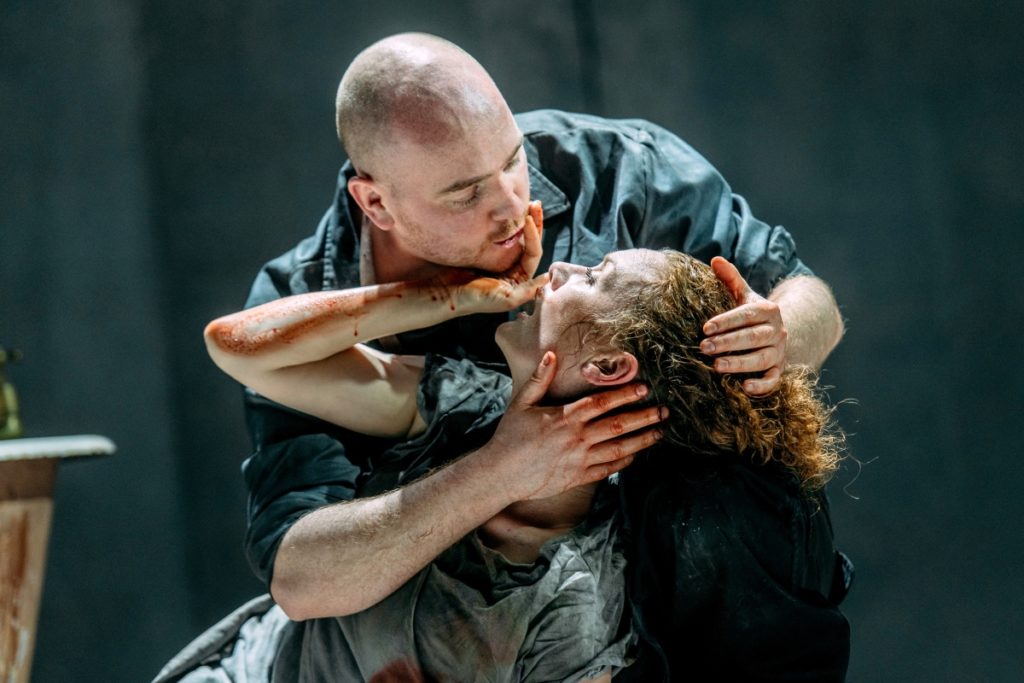
The Duchess [of Malfi]
This finely-staged drama is a visceral exploration of male violence and oppression, at once gripping, terrifying and mesmerising.
A purposely nervous but soulful song starts the action in a stark, stripped back setting, and Kirsty Stuart quietly asserts both her power and her fragility from the start.
Based on John Webster's Jacobean revenge tragedy, The Duchess is given a fresh and darkly contemporary update with writer and director Zinnie Harris' incisive dialogue. Combined with strong performances and stark, minimalist staging, this harrowing story of male rage and female resistance to oppression modulates from elegiac beginnings into scenes of dark, violent horror in the second act.
If you are unfamiliar with the story coming to this piece, it is a noir thriller that descends into frightening darkness. For those that know the tale, this still shocks, unsettles and intrigues. And there is blood, so much blood. Interestingly, the programme is quite different - it comes in the form of a full copy of the play's text.
Every character on stage is tightly drawn and played expressively, and the themes of oppression and veiled violence build slowly through the use of language and a growing conspiracy between the Duchess' two brothers, who are desperate to control and suppress their sister in every possible way. It is not hard to draw parallels with modern day male dominance, sexist abuse of power, and controlling behaviour and language.
But what sets this work apart as a piece of theatre are the truly shocking scenes of violence, burned onto the retina and bored into your skull over and over again with a harsh klaxon. The male desire to dominate and control moves from the use of persuasive language and attempted coercion in the first act into desperate, horrifying and manic destruction in the second, with the opening tableau of the second act an ominous harbinger of unspeakable, barbaric acts. And yet, despite of all of this, there is a message of hope at the end, as the Duchess' remorseful murderer is bonded with her young son and urged to change this cycle of terror and blood.
Stuart as the Duchess is a quietly dominant figure, and her joyous and loving character is revealed with great dexterity and control. ‘You should know: I sing at parties, I wear colourful dresses, I am headstrong, I won’t wear my hair up because you say I should, or do this because you prefer it, in fact I might do the other just to be contrary, but I am utterly and always myself.’ Her chosen, unassuming partner Antonio, shows a quiet delight in her love, and is brought to life with finesse by Graham Mackay-Bruce.
Her brothers, as they descend into ever darker depths, are played with subtle nuance, with George Costigan impressive as a darkly cynical Cardinal, and Angus Miller's Ferdinand's descent into horrible, animal madness, is made starkly real. The deeply conflicted character of Bosola is played spectacularly by Adam Best, and his evolution from stable boy to executioner, and on to a perhaps redemptive role of guardian, is frightening in its clarity and credibility. Even the relatively lesser roles of Delio (Adam Tompa) and Leah Walker's Julia, are finely drawn and convincing, and a special mention has to be made for Fletcher Mathers' precision and credibility in the dual roles of the Maid Cariola, and the Doctor in Act 2.
The set design is minimal and still effective, with props, screens and sheets moving around quickly and with little effort to draw us into different scenes, with lighting and sound design working to devastating effect in the torture and murder scenes. The montage images used to torture the Duchess, and the electric crackling sounds as character names are projected onto the set work, echoing Brecht's theatre devices, to effectively produce a sense of alienation. The musical interludes, ably amplified and accompanied by Eleanor Kane, both positive and optimistic Act 1, are just as beautiful to listen two when they take a darker, more deathly turn in Act 2. Two child actors from the Young Company are both at ease and effective in their roles to complete a great ensemble performance.
This production will most definitely shock you, mainly because it is a story that is still so relevant to our times. The story of The Duchess is a story that, for all the very worst reasons, has not grown old.
4 stars ★★★★
17 May - 8 Jun 2019
17 May - 8 June 2019
PREVIEWS, 7:30pm
Friday 17, Saturday 18 and Monday 20 May, 7.30pm
£10 (Preview tickets on sale from 15 April)
EVENINGS, 7:30pm
Tuesday - Saturdays
MATINEES from 22 May, 2pm
Wednesdays and Saturdays
Running time: 2hrs 30 minutes, includes one 20 minute interval
Individual Tickets
EVENINGS
Tuesday - Saturday: £16 - £32
MATINEES
Wednesday and Saturday: £14 - £28.50
CONCESSIONS
from £10, not available on Premium Seats
For full details on concession pricing please contact Box Office on 0131 248 4848

